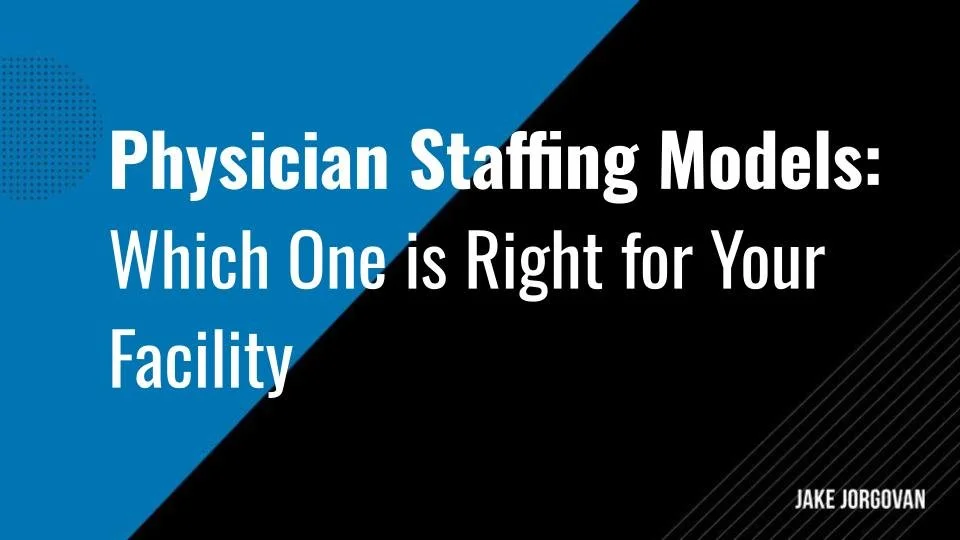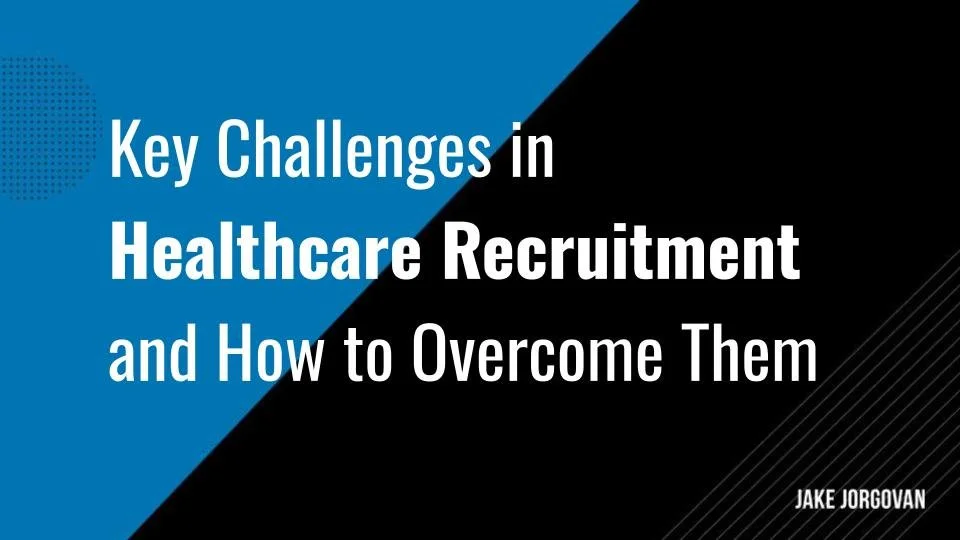How to Conduct Effective Interviews for Surgeon Recruitment in 2025
In surgeon recruitment, pinpointing the right candidate transcends mere credentials.
Remember: You risk patient outcomes and team dynamics with each hiring decision.
Luckily, you’re on the right page. This article gives you:
Best practices to streamline your interview process.
Key questions that uncover not just competence but potential.
Traits that signal a surgeon's readiness beyond their technical skills.
Efficiency tips to maintain rigor without sacrificing depth.
All this will help you elevate both patient care and hospital reputation.
Ensure your strategy is as precise as the surgeries your candidates will perform.
Preparation for the Interview
Define Clear Objectives
Defining clear objectives ensures focused interviews because you can align candidate skills with job needs. Precision aids in identifying the right fit and don’t waste time on irrelevant details.
Follow these steps:
Establish Interview Goals:
Determine the purpose of the interview.
Clarify what you aim to achieve with each question.
Align interview objectives with organizational needs.
Identify Specific Competencies:
List the necessary surgical skills.
Highlight experience with specific procedures.
Include patient care and multidisciplinary collaboration abilities.
Set Performance Metrics:
Define measurable criteria for evaluating candidates.
Ensure metrics are relevant to the role.
Use these metrics consistently across interviews.
Align with Organizational Culture:
Ensure the candidate fits the team dynamic.
Assess their adaptability to your work environment.
Look for alignment with your organization's values.
Prepare Evaluation Tools:
Develop a structured scoring system.
Use rubrics to maintain consistency.
Train interviewers on using these tools effectively.
Insider tip:
Create a competency map for each surgical role and match specific skills to interview questions. This visual tool helps you stay focused and quickly identify gaps in a candidate's expertise. Use it to guide your questioning because it streamlines the evaluation process, making it more precise and efficient.
Develop a Structured Format
A structured format ensures consistent evaluations. You can also compare candidates fairly and objectively because standardized questions reduce interviewer bias. This method uncovers true competencies effectively, so structured interviews save time and resources..
Follow these steps:
Create a Standardized Question Set:
Develop core questions for all candidates.
Focus on surgical skills, patient care, and problem-solving.
Ensure questions are clear and concise.
Include Content-Related Components:
Ask about specific surgical procedures.
Evaluate their experience in multidisciplinary teams.
Explore their approach to post-operative care.
Incorporate Evaluation-Related Components:
Use situational questions to assess problem-solving.
Inquire about handling surgical complications.
Evaluate adaptability in unexpected situations.
Design a Scoring Rubric:
Assign scores to each response.
Use consistent criteria for all candidates.
Ensure rubrics cover all key competencies.
Train Interviewers:
Educate interviewers on using the structured format.
Emphasize the importance of consistency.
Minimize personal biases in evaluations.
Review and Adjust:
Regularly review the interview format.
Make adjustments based on feedback.
Ensure the format remains relevant to current needs.
Insider tip:
Use behavioral anchors for scoring. Define specific examples of high, medium, and low performance for each question. This clarifies expectations and improves consistency. It helps interviewers quickly identify where candidates excel or fall short, making the evaluation process more objective and precise.
Pre-interview Research
Pre-interview research enhances your understanding of candidates because you assess their background thoroughly. This preparation uncovers relevant experience quickly, so it helps tailor your questions effectively. Research also identifies potential red flags early.
Follow these steps:
Review Candidate CVs:
Examine their educational background.
Note their surgical training and certifications.
Identify their years of experience and career progression.
Analyze Portfolios:
Look at documented surgical cases.
Evaluate the complexity and variety of procedures.
Assess outcomes and any published research.
Understand Background:
Investigate previous employment and roles.
Check for experience in similar settings.
Note any leadership positions or special projects.
Identify Key Skills:
Highlight specific surgical techniques they mastered.
Note experience with innovative technologies.
Assess patient care and multidisciplinary collaboration skills.
Prepare Specific Questions:
Tailor questions to their experience and gaps.
Ask about their approach to challenges they faced.
Explore their contributions to previous teams.
Check References:
Contact previous employers or colleagues.
Verify their claims and performance.
Gather insights on their work ethic and professionalism.
Insider tip:
Look for patterns in candidates' case logs and identify trends in their surgical outcomes. Compare these with industry benchmarks to reveal their consistency and areas of strength. Basically, this analysis provides a deeper understanding of their practical experience, beyond what a CV shows.
Conducting the Interview
Setting the Tone
Setting the right tone fosters open communication because you establish a professional yet welcoming environment. This approach eases candidate nerves, enabling authentic interactions. It also facilitates honest exchanges, crucial for assessing fit. Even more importantly, a proper tone reflects your organization’s professionalism and impacts candidate perception positively.
Here's how you can set the tone effectively:
Prepare the Interview Space:
Choose a quiet, comfortable room.
Arrange seating to be non-confrontational and open.
Ensure the space is tidy and professionally arranged.
Welcome the Candidate:
Greet them at the door if possible.
Introduce yourself clearly and warmly.
Offer a firm handshake to convey confidence.
Maintain Professionalism:
Dress in appropriate business attire.
Keep your posture open and inviting.
Use polite language and a calm tone.
Engage with Eye Contact:
Maintain eye contact as you speak.
This shows interest and encourages openness.
Avoid staring to keep the atmosphere relaxed.
Set Expectations:
Briefly outline the interview’s structure.
Explain what you hope to cover.
This prepares candidates for what’s ahead.
Insider tip:
Start with a personal anecdote related to surgery or patient care. This not only breaks the ice but also subtly assesses the candidate's empathy and personal engagement. It prompts them to share similar experiences, providing valuable insights into their personality and values.
Asking the Right Questions
Asking the right questions uncovers competencies, letting you gauge surgical skills and problem-solving abilities. Besides, these inquiries reveal how candidates handle stress. Questions also assess communication, eamwork efficacy, and candidates’ patient care philosophies. Basically, this process ensures you select the most suitable surgeon.
So, here’s what you need to probe into:
1. Professional Competence
Evaluating professional competence is fundamental to identifying the right surgeon. Follow these steps to delve into their surgical expertise and team interaction skills:
Inquire About Surgical Procedures:
Start by asking about their most frequently performed surgeries.
Ask them to describe a complex procedure they've managed.
Request specifics on the techniques and tools they prefer.
Probe for Detailed Experiences:
Request examples of successful outcomes in challenging surgeries.
Inquire about any innovations or improvements they have implemented.
Ask for instances where they had to make critical decisions.
Discuss Multidisciplinary Team Interactions:
Ask how they coordinate with other healthcare professionals.
Probe into their role in a team during complex cases.
Inquire about how they handle disagreements within the team.
Evaluate Communication:
Observe how clearly they explain medical procedures.
Assess their ability to convey complex information succinctly.
Look for Leadership:
Ask about their leadership in team settings.
Inquire about mentoring or training roles they’ve held.
Insider tip:
During the discussion on multidisciplinary team interactions, note their language use. Focus on whether they speak in terms of "we" or "I." This subtle cue reveals their teamwork orientation and leadership style, helping you discern their true collaborative nature in high-pressure environments.
2. Patient Care
Here’s how you can effectively inquire about their post-operative care and interactions with patients and their families:
Inquire About Post-Operative Practices:
Ask them to describe their standard post-operative protocol.
Probe for specific measures they take to ensure patient recovery.
Request details on how they handle common post-surgical complications.
Assess Follow-Up Practices:
Ask about their routine for follow-up appointments.
Inquire how they monitor patient progress post-discharge.
Discuss the tools or systems they use for tracking patient outcomes.
Explore Patient and Family Interactions:
Ask for examples of how they communicate complex medical information to patients and families.
Inquire about their approach to managing patient expectations and emotional support.
Request instances where they had to navigate sensitive family dynamics.
Evaluate Empathy and Support:
Observe their tone and language when discussing patient cases.
Consider how they emphasize patient comfort and understanding.
These focused questions help you gauge how well a surgeon prioritizes patient welfare and interacts with patients and their families, essential aspects of holistic care.
Insider tip:
Consider conducting part of the interview in a clinical setting. Observe the candidate interacting with a simulated patient or colleague. This method reveals authentic reactions and bedside manner, providing a clear picture of their practical empathy and communication skills under observational conditions
3. Problem-Solving and Adaptability
Here's how to effectively inquire about their handling of surgical errors and management of unexpected situations:
Discuss Surgical Errors:
Start by asking them to describe a surgical error they've encountered.
Request details on how they identified and addressed the error.
Inquire about the lessons learned and any changes implemented post-incident.
Evaluate Handling of Complications:
Ask them to provide examples of unexpected complications during surgery.
Probe into their decision-making process during these moments.
Discuss how they communicate these situations to the team and patient families.
Assess Adaptability:
Inquire about times they had to deviate from standard protocols.
Ask for instances where they innovated under pressure.
Evaluate their ability to remain calm and effective in crisis situations.
Explore Continual Learning:
Ask how they stay updated with new surgical techniques and technologies.
Discuss their involvement in continuous professional development.
These inquiries provide insights into their clinical acumen, resilience, and ability to maintain high standards of care under pressure.
Insider tip:
Simulate a crisis scenario during the interview. Pose a hypothetical surgical complication and observe their problem-solving approach. This strategy reveals their real-time decision-making skills and adaptability, offering a direct insight into how they perform under pressure.
Traits to Look For
Identify key traits that indicate a surgeon's capability. You must evaluate technical skills, communication, teamwork, and empathy. These qualities ensure the surgeon excels in patient care and collaborates effectively.
Let’s see how you can recognize these traits to secure a competent addition to your medical team.
Technical Skills and Expertise
Ensuring a surgeon has the necessary technical skills and expertise is key to successful recruitment.
Here's how to verify their surgical competencies and specializations:
Review Credentials:
Check their medical qualifications and certifications.
Ensure they have relevant specialty training.
Discuss Surgical Experience:
Ask about the volume and types of surgeries performed.
Inquire about any advanced techniques they have mastered.
Evaluate Technical Knowledge:
Pose technical questions related to their specialty.
Assess their familiarity with the latest surgical technologies and practices.
Request Case Studies:
Ask for specific examples of complex cases they've handled.
Evaluate their approach and outcome to understand their skill level.
Check References:
Contact former colleagues or supervisors.
Confirm their practical skills and procedural success rates.
Observe in Action:
If possible, arrange for a practical demonstration or a surgical observation.
This detailed evaluation helps you understand not just their qualifications on paper, but their actual performance and expertise in surgical environments.
Insider tip:
Cross-reference their surgical log with peer-reviewed publications. Look for authored articles on specific techniques they claim proficiency in. This validation not only confirms their technical skills but also their commitment to advancing in their field. It provides a robust, multifaceted view of their expertise.
Communication Skills
Here’s how you can assess a candidate's ability to communicate clearly with patients and team members:
Conduct Role-Playing Scenarios:
Simulate a patient consultation to observe how they explain diagnoses and treatments.
Watch their interaction style and how they handle patient questions or concerns.
Discuss Team Interactions:
Ask about their experience working in multidisciplinary teams.
Inquire how they communicate during stressful or emergency situations.
Evaluate their ability to clearly articulate ideas and instructions.
Review Feedback from Peers:
If available, review feedback from colleagues or subordinates about their communication style.
Assess comments on their ability to foster a collaborative environment.
Analyze Language Use:
Note their clarity, terminology, and adaptability in speech during the interview.
Observe whether they adjust their language for non-technical listeners.
Evaluate Listening Skills:
Ask complex questions to see how they interpret and respond.
Note whether they listen fully before answering or tend to interrupt.
These techniques will help you gauge how effectively a surgeon can communicate, ensuring they are both understood by their patients and can work effectively within a team.
Insider tip:
During interviews, subtly introduce unexpected changes or corrections to see how they handle them. This tests their ability to communicate under stress and adapt their explanations or directions quickly. It’s a powerful way to assess real-time communication skills in high-stakes surgical environments.
Teamwork and Collaboration
Teamwork and collaboration are vital for success in multidisciplinary medical settings.
Here’s how to assess a surgeon’s experience and abilities in these areas:
Inquire About Multidisciplinary Settings:
Ask for specific examples where they have worked within a multidisciplinary team.
Probe into their role and contributions in such settings.
Discuss Leadership Roles:
Question them about any leadership positions they have held.
Ask how they managed team dynamics and workflow.
Evaluate Cooperative Skills:
Present hypothetical scenarios involving team conflicts.
Observe how they propose to resolve these issues.
Listen for mentions of compromise, communication, and problem-solving.
Assess Adaptability:
Inquire about times they had to adapt to team changes.
Ask how they integrated new members or technologies into their team.
Review References:
Contact former colleagues or supervisors to discuss their teamwork and leadership qualities.
Seek feedback on their ability to foster a positive team environment.
Insider tip:
When evaluating teamwork, focus on how they discuss peers and support staff. Pay attention to whether they acknowledge others’ contributions or focus solely on their own role. This distinction provides insights into their true collaborative nature and potential for fostering a positive team atmosphere.
Empathy and Patient-Centered Care
Empathy and a patient-centered approach are fundamental in surgical care.
Here’s how you can ensure a candidate prioritizes patient welfare and comfort:
Discuss Patient Interactions:
Ask them to describe how they communicate diagnosis and treatment plans to patients.
Probe for examples of handling sensitive situations with patients or their families.
Evaluate Empathy:
Inquire about specific instances where they had to show empathy.
Observe their tone and choice of words when discussing patient care.
Assess Patient Advocacy:
Ask how they have advocated for patient needs in past roles.
Discuss situations where they went beyond standard care to assist a patient.
Review Feedback Mechanisms:
Inquire about how they receive and incorporate patient feedback.
Ask for examples of changes implemented based on patient interactions.
Explore Patient-Centered Initiatives:
Ask about programs or initiatives they have led or participated in that focus on patient welfare.
Discuss their involvement in patient education or community health programs.
Insider Tip
During the interview, present a case involving ethical dilemmas or challenging patient relations. Ask how they would handle it. This not only tests their empathy but also their ethical reasoning and patient-centered approach, revealing deeper insights into their values and decision-making process in care scenarios.
Tips for Efficiency and Effectiveness
It’s important to ptimize your interview process to secure top surgical talent efficiently. That’s why you need strategies that streamline evaluations and enhance decision-making.
This section gives you the practical tips to refine your approach, ensuring each step from planning to decision is both efficient and effective.
Consistency:
Use the same questions for all candidates.
Ensure questions cover all necessary competencies.
This standardization aids in fair and comparable evaluations.
Evaluation Metrics:
Implement rating scales or scoring rubrics.
Define clear criteria for each rating point.
Use these metrics to maintain uniformity in assessments.
Training for Interviewers:
Provide comprehensive training on interview techniques.
Educate on the evaluation criteria and how to apply them.
Focus on reducing personal biases in assessments.
Feedback and Follow-up:
Establish protocols for post-interview communication.
Design a system to collect and analyze feedback from interviewers.
Use this feedback to refine future interviews and selection processes.
Applying these steps ensures your interview process is both thorough and streamlined, leading to more effective recruitment outcomes.
Optimizing Surgeon Recruitment: A Strategic Conclusion for Enhanced Healthcare Outcomes
Structured interview processes are foundational in surgeon recruitment to ensure accuracy and depth in your selection. You may also partner with Surgical RPOs companies, through this you can streamline the recruitment process, ensuring you attract top-tier surgeons who are not only technically skilled but also aligned with your institution’s values and long-term goals.
Remember: The right hire significantly boosts patient outcomes and team efficiency.
Always refine your interview tactics based on feedback and results. This commitment to excellence shapes a premier healthcare environment.
Use the strategies we discussed above to pick the best surgeons and skyrocket your patient care.

































